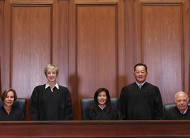6/6/2014
California Supreme Court Rescues Red Light CamerasHighest court in California closes the door on Confrontation Clause challenges to red light camera tickets.

The California state lawmaker who once said his legislation would "rein in red light camera abuses" was not accurately describing the bill's primary effect. On Thursday, the California Supreme Court made it abundantly clear that Senate Bill 1303 (view bill) demonstrated the legislature's intention to save red light cameras whose evidence was challenged as hearsay.
"Our conclusion that the [red light camera] evidence does not constitute hearsay is confirmed by recent legislative action intended to clarify the non-hearsay status of [red light camera] evidence," Chief Justice Tani Gorre Cantil-Sakauye wrote for the unanimous court. "Because we find the statute to be declarative of existing law, no question of retroactive application is presented."
With that finding, the Golden State's camera programs no longer need to worry about legal challenges based on the series of US Supreme Court decisions, beginning in 2009 with Melendez-Diaz v. Massachusetts (view ruling), holding that the individual who does lab analysis of evidence can be called to testify about his findings in court.
In the case at hand, motorist Carmen Goldsmith was accused of running a red light by 0.27 seconds at Centinela Avenue and Beach Avenue in Inglewood. Redflex Traffic Systems, a private Australian company, mailed her a $436 ticket on March 13, 2009. When she challenged the ticket at trial, Inglewood Police Officer Dean Young gave his standard testimony about the functioning of the red light camera system owned and operated by Redflex. He had not actually analyzed any evidence, he merely repeated what Redflex had told him. Goldsmith argued this was the textbook definition of hearsay. The California justices rejected this line of reasoning.
"Consistent with Lopez, we conclude that our determination that the ATES evidence is not hearsay necessarily requires the rejection of defendant's confrontation claims," Justice Cantil-Sakauye wrote. "Because, unlike a person, a machine cannot be cross-examined, here the prosecution's introduction into evidence of the machine-generated printouts... did not implicate the Sixth Amendment's right to confrontation."
The justices also rejected the contention that automated ticketing traffic court trials turn into a kangaroo court where commissioners only listen to the Redflex-trained police officer and ignore the defendant's characterization of events. Thursday's ruling held that making any changes to the current arrangement would constitute the creation of "special rules" for photo ticketing trials.
"We find no legal ground for adopting heightened evidentiary requirements for infractions, specifically one type of alleged infraction -- traffic violations in red light camera cases," Justice Cantil-Sakauye wrote. "Nor does the relative speed and informality of traffic court support imposing unique requirements for the admission of [red light camera] evidence."
A copy of the decision is available in a 220k PDF file at the source link below.


